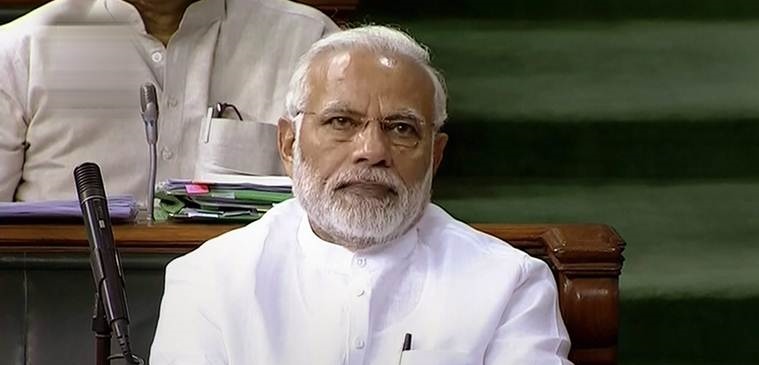No Confidence in Indian Governance
July 21, 2018 | Expert Insights

The Telugu Desam Party (TDP), ruling power in Andhra Pradesh, introduced a motion of no-confidence against the BJP-led NDA coalition in the Lok Sabha on 20 July.
Background
The Indian bicameral parliament is divided into the Lok Sabha and Rajya Sabha as lower and upper houses respectively. Members are elected to the 545 seats of the Lok Sabha through universal adult suffrage. Seats are reserved for women, Anglo-Indians, Scheduled Castes and Scheduled Tribes. Each state is allotted seats based on population, thus, populous states like Uttar Pradesh hold 80 seats compared to Union Territories like Pondicherry or smaller states like Mizoram who hold 1 seat each.
A motion of no-confidence is a statement or vote which states that a person in a position of responsibility is no longer deemed fit to hold that position, owing to their inadequacy, failure to carry out obligations or undertaking decisions which members feel are detrimental. In many parliamentary democracies, the proposal of a no confidence motion is limited to a strict window of four to six months or more. Hence, the timing is a matter of political judgement.
While Article 75 of the Indian Constitution specifies that the council of ministers shall be collectively responsible to the House of the People, there is no mention of a no-confidence motion in the constitution. If a majority of the members of the house vote in favour of the motion, the motion is passed and the Government is bound to vacate the office.
Acharya Kripalani moved the first-ever no confidence motion on the floor of the Lok Sabha in August 1963, immediately after the disastrous India–China War. As of July 2018, 20 no-confidence motions have been moved. Indira Gandhi faced the most number of no-confidence motions – 15 times, followed by Lal Bahadur Shastri and Narasimha Rao (thrice each), Morarji Desai (twice) and Jawahar Lal Nehru, Rajiv Gandhi, Atal Bihari Vajpayee and Narendra Modi (once each).
Analysis
During the Budget Session, held between January 20 and April 6, several MPs had given notices for a no-confidence motion against the Modi government. On 20 July, Sumitra Mahajan, speaker of the Lok Sabha had proposed the motion for a voice vote first, after which she ruled that the Treasury benches had won the poll. Following this, the division vote was recorded with the help of automatic vote recording system. The Narendra Modi-led National Democratic Alliance (NDA) government defeated a no-confidence motion by 199 votes. 126 MPs voted in favor of the motion, while 325 rejected it. With a 12-hour long debate and mudslinging amongst political parties, the Lower House witnessed one of its most productive sessions in recent months.
According to PM Modi, the no-confidence motion against his government had originated as a result of the Opposition’s arrogance. He had stated that some people, particularly the Congress, were indulging in negative politics and called on parties to dismiss the motion. His speech was met with criticism by Congress leader Mallikarjun Kharge, who said, “We posed questions to Prime Minister Narendra Modi on the Rafale deal, Nirav Modi etc., but he didn't answer any. His speech was 'dramebaazi.' He didn't say anything for the people of Andhra Pradesh. He was telling us what previous governments have done and not what his government has done in four years.”
One of the major criticisms of the Opposition was with regard to the French Rafale deal. Congress President Rahul Gandhi said, “The Rafale deal has been taken away from HAL and given to a businessman who has benefited Rs. 45,000 crore. The gentleman has never built an aeroplane in his whole life.”
Andhra Pradesh CM and Telugu Desam Party (TDP) Chief N Chandrababu Naidu reacted to Modi’s speech saying, "Entire Andhra Pradesh waited for justice, only to be disappointed again. They have majority but they breached "neeti". The Prime Minister's speech has caused much pain. As part of our continuous fight, we introduced this no-confidence motion. In the last four years, I went to Delhi 29 times. Instead of doing justice to AP, he is resorting to political attacks on me alleging I took U-turn.” However, Modi had warned the CM not to fall into the YSR’s trap, when TDP had left NDA. He further stated that the government will do everything possible for the development of Andhra Pradesh.
Meanwhile, CPM leader Sitaram Yechury attacked Modi on hiding data on farmer suicides. "If Modi has any desire to answer serious concerns, he should reveal why his government is suppressing data on farmer suicides? Or lynchings in the past four years,” he said.
Assessment
Our assessment is that the failure of the no-confidence motion has established that the BJP-led NDA coalition has the majority support of the parliament. We believe that the decision of the opposition was more symbolic, and has to do with the forthcoming general elections.








Comments